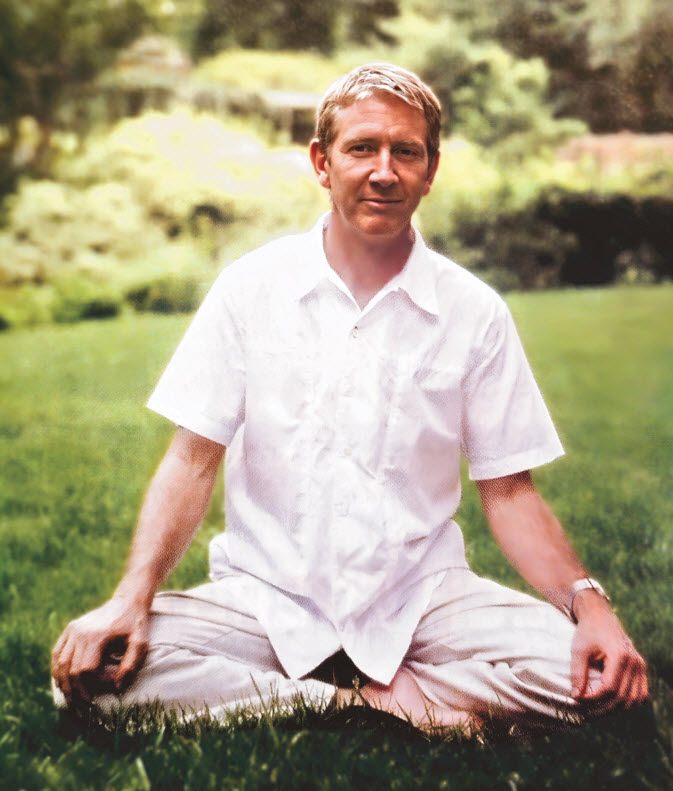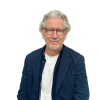Looking Back
by Patrick Holford
Odyssey Namaste April May 2004
With a loyal and large following in South Africa, Patrick Holford needs little introduction – making a name for himself internationally as a leading expert in holistic health. Although little is known about Holford ‘the man’, this is not due to a lack of a personal life, as Shihaam Parker finds out.
What motivates you?
The Dalai Lama reminds us that all human beings have two fundamental desires – to be happy and to be free of pain. I try to remember that my desire to be happy and free of pain is of no greater or lesser importance than whomever I am with. When your body and mind are in 100 per cent health, it gives you the opportunity to reach your full potential, whatever that might be.
Tell us about Patrick Holford the family man?
I share my home with my fiancée, Gaby. She’s a healer and used to be in the rock and roll business and often comes with me on lecture tours, taking care of the details so I can focus on my teaching.
My son, Kyle, is here much of the time. He’s an ace DJ (drum and bass style) training and working in music production. He has great taste and can get any dance floor jumping. He was born in the same year as the Institute for Optimum Nutrition (1984) and recently did all the audio visual for a big conference we did on Optimum Nutrition for the mind and did a great job.
My daughter, Jade, lives with her Mum and step Dad up the road most of the time. She’s hell bent on becoming a doctor and runs for London and, boy, is she fast.
Describe what you love about your home?
I’ve opened up the living space so, when you walk in, you can see all the way through into the Japanese style garden, through the temple-like conservatory, with hanging vines of stephanotis, that flowers for half the year, with a jasmine-like fragrance.
There are mementos from various adventures: A rock from Mount Kailash in Tibet; a meteor given to me by a Shaman I worked with in Peru; a conch (sea shell) from the Pacific; a beautiful woven, hanging fabric from the Shipibo tribe in the Amazon who imbibe a plant called ayahuasca which reveals to them the healing power of plants.
Both my fiancée and my son have developed a love of cooking since we ‘upgraded’ our kitchen. Everything is within arms-reach for a great creation – ginger, garlic, coconut, spices, cinnamon, chilli, lemongrass, perhaps a vegetable or a fish-based steam fry with wild rice, pasta or sweet potatoes. Great soups are often created, each different from the last. I love cooking, but don’t get enough time.
Would you call yourself a spiritual person?
I have had numerous ‘spiritual’ experiences that have shown me that the true nature of who we are is magnificent, all-wise, loving and eternal. I call that ‘the self’ or the essence of who we are. For me this is not a belief, but an experienced reality – unfortunately, not all the time.
My first spiritual experience was when I was 14 years old and since then I’ve read, studied and searched for teachers and systems that explain the fullness of who we are. I was an avid reader of Carl Jung and Herman Hesse as a teenager. To this day I think the Glass Bead Game is one of the all-time best books.
What belief system do you feel closest to?
The three philosophies that have the most ‘juice’ as far as I’m concerned are Dozgen Tibetan Buddhism, Kashmir Shaivism and the teachings of Socrates and the Platonists.
Not many people realise that the wisdom of Socrates moved into Sufism and Islam when the Neo-Platonists were kicked out of Athens. From there the knowledge moved across into Kashmir and into India and Tibet.
I know there is one essence, one truth, one light and for this reason I have difficulty aligning to any one religion in such a way as to exclude others. I believe most religions at their true core are describing the same reality.
What centres you spiritually?
I spend a lot of time in my head, thinking, and there’s something very grounding about walking in nature. Having your feet on the earth, breathing better air.
Exercise is known to be highly effective for depression, and I think exercise in nature also gives you time to contemplate and feel part of the larger scheme of things.
Do you have a personal motto or mantra?
I have many favourite sayings, which help me to look at things differently.
My top three are: “only the ego is serious” – this reminds me not to be too attached to any position and that most problems are transient and soluble.
“No good deeds go unpunished“ – most parents of teenagers might relate to this one. It reminds me to offer my good intentions but not get too attached to the results.
The last is the definition of insanity: “to keep doing the same things and expect different results”. I see this all the time in sick people who don’t really want to change anything.
I believe it is almost criminal for a doctor to recommend a patient to have a breast tumour removed without counselling her about the known contributors to breast cancer, such as diet, alcohol, stress, lack of exercise and HRT (Hormone Replacement Therapy).
What do you find the most irritating about yourself or other people?
I get immensely frustrated by the piles of European legislation that aims to control the shape of medicine in the future, leaving less and less room for a nutritional revolution. I am quite impatient and drive myself and others quite hard at times. I don’t like wasting time. I like adventures and try to do things ‘out of the box’ occasionally. Last week I took my kids snowboarding by Mont Blanc. We had a good week, although some of it was ‘stealth’ boarding in blizzards. I can still keep up but my days are numbered.
Who would you say has been your greatest role model or had the strongest influence on your life?
I’d say Dr Linus Pauling; a Bolivian philosopher called Oscar Ichazo and an Indian guru called Swami Muktandanda. Swami Muktandanda died in 1982 but was so full of wisdom. I remember someone asking him ‘How do you know if you’re doing the right thing?’ he answered: ‘From the results’. Someone else asked: ‘Is there a difference between a living master and a dead master?’ He answered: ‘Yes, a living master can tell you things’. ‘What kind of things?’ the man replied. Muktandanda said, ‘You’re too fat’.
Oscar Ichazo is alive and kicking and has taught me more than I can say. My mentor in nutrition, Dr Linus Pauling, was the founding patron of Institute for Optimum Nutrition. He had two unshared Nobel prizes and 48 doctorates – what a mind. He used to tell me not to worry about the double-blind randomised controlled trials – they come later. The important thing, he said, was the logic of your propositions.
What is the secret of your success and what advice would you give to people to whom you’ve become a role model?
You have to share your own truth, whether others like it or not.
Most of us are so concerned over the opinions that others hold of us that we forget that others are likewise concerned over our opinions of them; hence no one expresses their personal truth. It takes courage, passion and energy to push beyond the status quo and to get up every morning and keep doing it. There’s an old Chinese proverb that says ‘perseverance furthers’. If you believe in something you have to stick with it. I also believe in experience. I’ve tried many things, many diets, many supplements and I’m always experimenting. It’s good to be sceptical, but try it anyway, for at least a month. That’s what I say to people who are sceptical about the power of optimum nutrition.
What advice would you give to people who want quick fixes, shortcuts to happiness through substance abuse?
I think we all want shortcuts to happiness and most of us learn that the shortcuts, such as drugs, don’t work in the long run. However, it is natural for people, especially adolescents, to experiment. Parents can’t sit back and get drunk on a regular basis then give their kids a hard time for getting stoned. That’s just hypocrisy. The kids I know whose parents have been more honest with them usually end up with the most sensible attitude towards all drugs, including caffeine, nicotine, alcohol, Ecstasy and Prozac. Most cultures, from the Egyptians and Greeks to the Indians and existing Shamanic cultures, use mind-altering plants in ritualised ways. In the right circumstances, such experiences can open the door to a fuller understanding of who we are. In the wrong circumstances, such experiences can make people crazy and, with over-indulgence, damage you. It’s a fine line.
What would you say is the path to spiritual enlightenment, happiness and personal growth?
One man said ‘I do good things, I feel good. I do bad things, I feel bad. That’s my religion.’ I believe we all have inner wisdom that we have to listen to, to make the right choices in life. If we betray our own inner direction we end up depressed and unfulfilled. I believe in being kind and true to yourself and others. Life always gives you opportunities to grow. It is your choice whether you take them. For me optimum nutrition is not only a means to feel great and stay free from sickness – it’s also an act of respect to this body of mine, through which I experience the many pleasures of this wonderful life.


